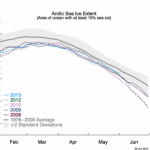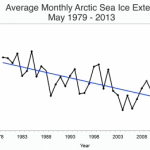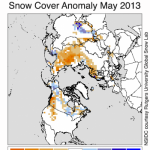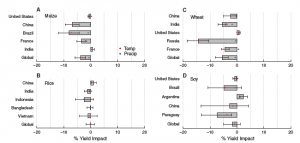The cold and wet weather in Europe is now having an effect on UK food production, according to an article in yesterday’s Guardian. Wheat yields are down 30%, crops are coming in later and food prices are rising. This is in addition to the catastrophic flooding in Europe, which is the worst in Bavaria in over 500 years.
So is this climate change?


Well, if Francis et al. (2012) are correct, it is quite possible that low Arctic sea ice levels have contributed to the intensification of spring storms and have altered the prevailing weather patterns. Sea ice levels are lower than their 1979-2000 average, and while not at an all-time low for this time of year, are around what’s been seen for the past few years, and are pretty close to being on-trend for the past 25 years.

It’s also possible that this could be related to snow pack changes in Siberia, which affect the Atlantic Oscillation (Cohen et al. 2001). It looks like snowpack anomalies were pretty low last year. All of these remote (teleconnected!) relationships between snow, ice, and weather patterns are stark reminder of the interconnectedness of the climate system. It’s not simply that increased CO2-> warmer everywhere and so what. Not to harken back to Hurricane Sandy-style statements, but this may be what climate change looks like. Of course, it may also be an exceptionally cold and wet spring. Climate is variable, and weather even more so – and not to sound like a scientist, but more research is needed before we can definitively pin this on a single cause. Hansen et al. (2012) suggested that extreme events would become more likely as a result of climate change. Is this what we’re seeing?
So now, back to the original point of this whole thing: Food! Seeing the reduction in wheat production (as well as other cereals) in the UK (and assuming that the Central European flooding is going to have an impact as well) reminds me of some of the case-studies I used during my proposal defense. In particular, the 1876-1877 El Niño-related drought in India (and China, and Brazil). ENSOs relationship with the Indian monsoon is well-known. Davis, in Late Victorian Holocausts (2001) argues that a strong El Niño, combined with British colonial capitalism to produce the massive Deccan famine in the 1870’s. These famines recurred, coinciding with El Niño events, for another 20 years. People starved to death by the millions while relief efforts were sub-minimal, and grain exports continued despite the famine. The loss of life, loss of property, and economic calamity from these events put India at a severe economic disadvantage, increased social stratification and strife, and led to conditions which stunted development on the sub continent for nearly a century – or so Davis claims.
Of course, that was 150 years ago, right? Nothing like that could happen today!
But we see the impact of extreme weather in our economic life all the time. The folks in Germany will need assistance at a time when the Eurozone is dealing with other economic calamities. UK farmers can’t make enough wheat to feed their people! Now, at a time of globalized agriculture, this isn’t a catastrophe, as grain will come from somewhere else. But now Britain is importing food. Farmers will need loans, and some will certainly default.

Global cereal production is falling (at least for wheat and maize), which means that issues of food security may, in the near future, become important. We like to think that we’re not as susceptible to food shortages because of droughts or floods as our ancestors, but food security is a real and serious consequence of climate change.
References
Comments by grustic